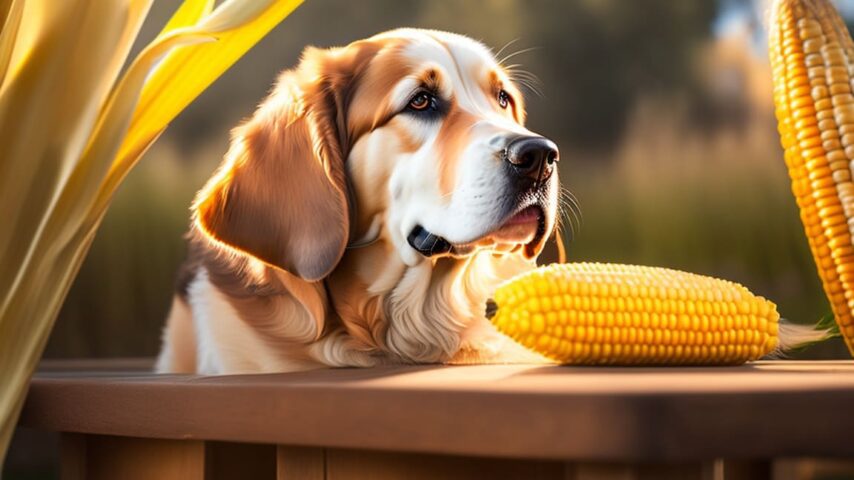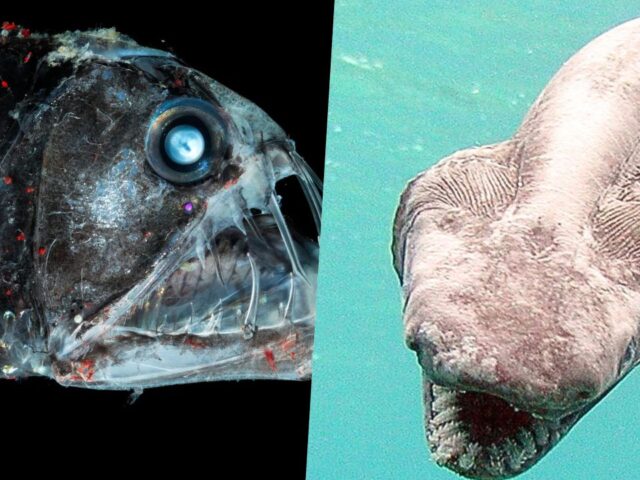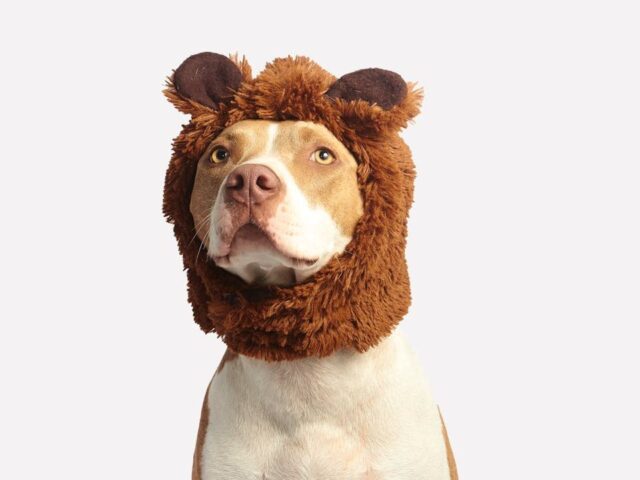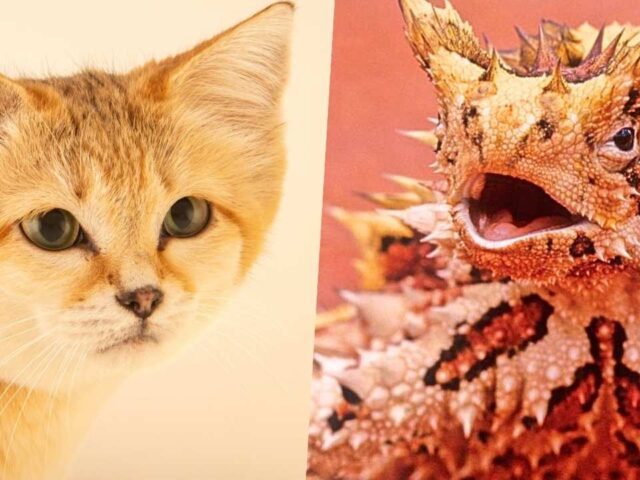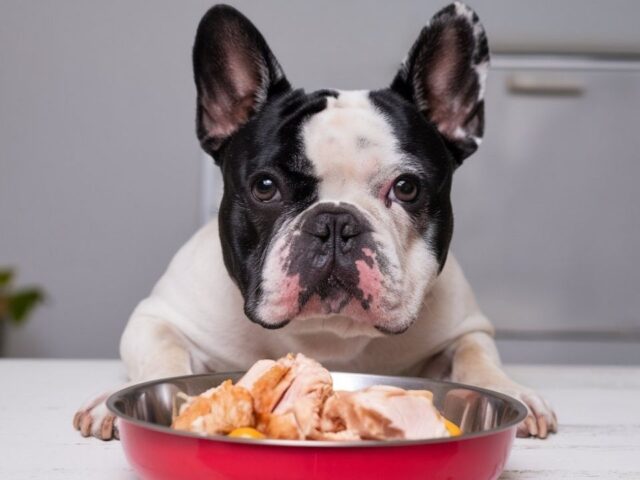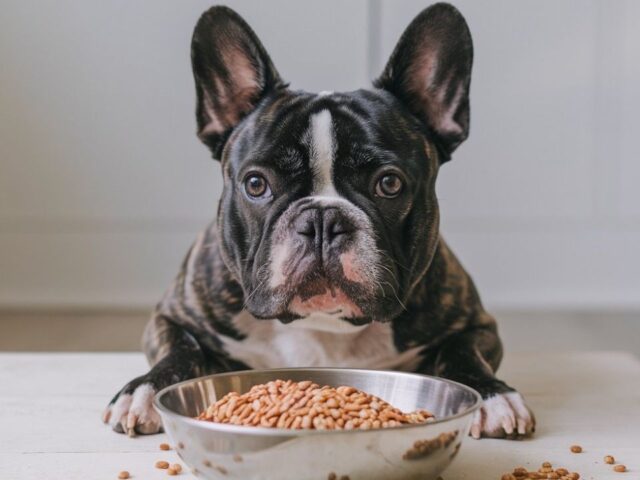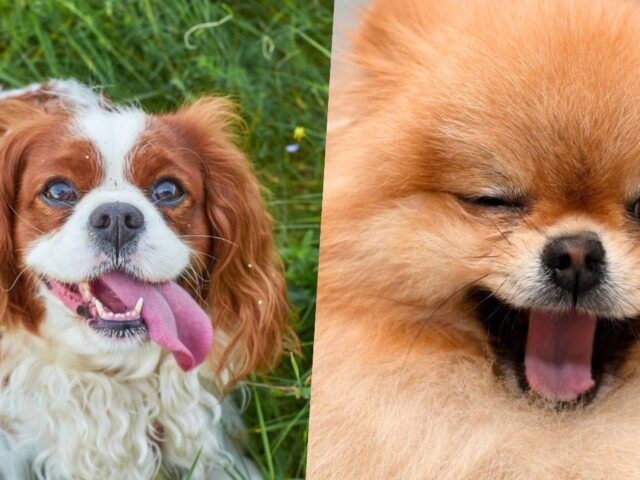When it comes to our furry friends, we want the best for their health and well-being. One question that often arises is whether or not dogs can safely eat corn. With so many opinions on pet nutrition, it’s essential to stay informed about what’s beneficial for your dog’s diet.
In this expert guide, discover the nutritional benefits of corn for dogs, potential risks and concerns, as well as recommendations for safely including this popular grain in your canine companion’s meals.
Table of Contents
- 1. Key Takeaways on “Can Dogs Safely Eat Corn”
- 2. Can Dogs Safely Eat Corn?
- 3. Nutritional Benefits Of Corn For Dogs
- 3.1 Protein And Amino Acids For Strong Muscles
- 3.2 Fiber For Digestive Health
- 3.3 Vitamins And Minerals For Overall Wellness
- 4. Risks And Concerns About Feeding Corn To Dogs
- 4.1 Identifying Corn Allergies
- 4.2 Digestive Issues Related To Consumption
- 4.3 The Presence Of Additives And Fillers In Corn-based Dog Foods
- 5. Expert Recommendations For Safely Feeding Corn To Your Dog
- 5.1 Consultation With A Veterinarian
- 5.2 Gradual Introduction And Portion Control
- 5.3 Observing For Adverse Reactions
- 5.4 Exploring Alternatives To Corn-based Dog Foods
- 6. Conclusion
- 7. FAQs on “Can Dogs Safely Eat Corn”
Key Takeaways on “Can Dogs Safely Eat Corn”
- Dogs can safely eat corn in moderation as it is a good source of fiber, carbohydrates, and essential nutrients such as protein and amino acids that contribute to strong muscles and overall well-being.
- While some dogs may have a sensitivity or allergy to this ingredient found in many commercial pet foods but still others do fine on it when given supplementally as part of a balanced diet under veterinary supervision.
- To avoid any potential digestive problems or allergies related to corn-based products, it’s important to gradually introduce corn into your dog’s diet, choose high-quality products from reputable brands with whole-food ingredients without harmful fillers or additives. Consulting with a veterinarian is also crucial for proper diagnosis and treatment in case of adverse reactions or pre-existing health conditions.
- Corn should make up no more than 10% of their daily calorie intake. Incorporating other vegetables like sweet potatoes or green beans as part of their diet can offer similar nutritional benefits without the risk of digestion-related issues.
Can Dogs Safely Eat Corn?
Dogs can safely eat corn in moderation, but it’s important to understand the nutritional benefits and risks associated with feeding corn to your furry friend.
Benefits Of Feeding Corn In Moderation
Feeding corn to your furry friend in moderation can offer several health benefits. As a rich source of fiber and carbohydrates, corn provides the energy that dogs need for their daily activities.
Additionally, corn is packed with essential nutrients such as protein and amino acids that contribute to strong muscles, making it an excellent choice for active dogs. For example, if you have a canine athlete participating in agility competitions or a working breed like Border Collies who engage in physically demanding tasks, adding moderate servings of corn can serve as a nutritious boost alongside other components of their balanced meals.
Preferred Types Of Corn For Dogs
There are certain types of corn that are more beneficial for dogs than others. These include:
- Whole, plain, cooked corn kernels: This is the best option as it is easily digestible and provides the most nutritional value.
- Cornmeal: This is a good source of carbohydrates for dogs but should be used in moderation.
- Corn gluten meal: This is a byproduct of corn processing and is rich in protein, making it a good addition to dog food.
- Ground corn: This is a common ingredient in many types of dry dog food and can provide some nutritional benefits, but should not be the main ingredient.
- Sweet corn: While safe for dogs to eat in moderation, it contains higher levels of sugar than other types of corn and should be given sparingly.
Overall, any type of corn fed to your dog should be part of a balanced diet and given in moderation to avoid any potential digestive issues or allergies.
Nutritional Benefits Of Corn For Dogs
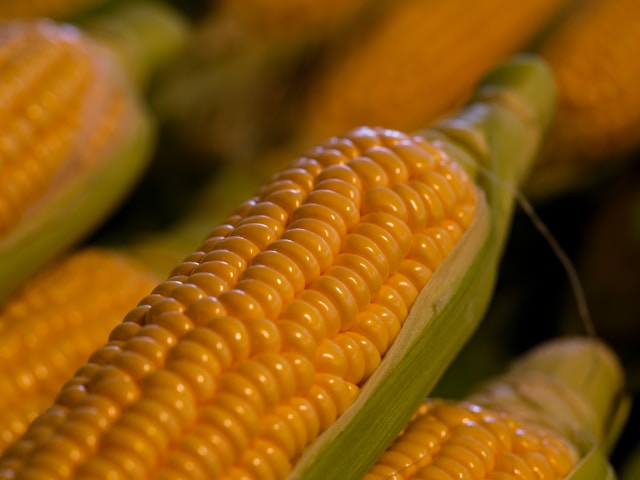
Corn is an excellent source of protein, fiber, vitamins and minerals that can contribute to your dog’s overall health and well-being.
Protein And Amino Acids For Strong Muscles
Corn is a good source of protein, which can help dogs develop and maintain strong muscles. In addition to protein, corn also contains amino acids that are essential for a dog’s overall health.
Amino acids play a crucial role in supporting healthy skin and coat, promoting healing and providing the building blocks for body tissues. Corn-based dog food is often fortified with additional amino acids to ensure that your furry friend gets all of the nutrients they need to lead an active and healthy lifestyle.
Fiber For Digestive Health
Corn is an excellent source of fiber for dogs, which can aid in their digestive health. This nutrient promotes regular bowel movements and helps prevent constipation, making it a crucial component of any balanced dog diet.
However, too much fiber intake may lead to bloating and diarrhea. So it’s essential to introduce corn slowly into your dog’s diet and monitor how they react to it.
Vitamins And Minerals For Overall Wellness
Corn is a great source of essential vitamins and minerals for overall wellness in dogs. It contains vitamin B6, which helps regulate metabolism and promotes healthy brain function.
Corn is also rich in thiamin, niacin, and pantothenic acid that aid in converting food into energy. Additionally, it offers antioxidants such as beta-carotene that support the immune system and help fight off infections.
Overall, incorporating corn into your dog’s balanced diet can provide numerous benefits for their overall health and wellbeing.
Risks And Concerns About Feeding Corn To Dogs
Although corn can provide several nutritional benefits for dogs, there are some potential risks and concerns associated with feeding it to your furry friend.
Identifying Corn Allergies
It’s important for dog owners to be aware of the signs of corn allergies in their furry friends. Some common symptoms include itching, redness, swelling, and gastrointestinal issues such as vomiting or diarrhea.
In some cases, dogs may not show symptoms until they have consumed corn consistently over time. It can be helpful to keep track of your dog’s diet and any changes in behavior or physical appearance after introducing new foods or treats that contain corn.
When feeding your dog any type of food containing corn, it is important always to read the label carefully and choose high-quality products from reputable brands that prioritize pet health and safety.
Overall, while some dogs may have a sensitivity or allergy to this ingredient found in many commercial pet foods but still others do fine on it when given supplementally as part of a balanced diet under veterinary supervision.
Digestive Issues Related To Consumption
Excessive consumption of corn can lead to digestive issues in dogs, including diarrhea and bloating. This is because dogs have a more difficult time digesting large amounts of carbohydrates compared to protein or fat.
Additionally, some commercial dog foods that contain corn may also include fillers or additives that could further upset your furry friend’s stomach. To avoid any potential digestive problems, it’s important to introduce corn into your dog’s diet gradually and in moderation.
You should also monitor your pet for any adverse reactions after consuming corn-based products and consult with a veterinarian if you notice any concerning symptoms like vomiting or lethargy.
The Presence Of Additives And Fillers In Corn-based Dog Foods
It’s important to note that not all corn-based dog foods are created equal. Some manufacturers may use additives and fillers to bulk up their products without adding any real nutritional value for your furry friend.
For example, some lower-quality brands may include corn gluten meal or corn syrup, which can be difficult for dogs to digest and offer minimal nutritional benefits.
As a responsible pet owner, it’s essential to review the ingredient list of any dog food you’re considering purchasing and aim for those with whole-food ingredients without harmful fillers or additives.
Expert Recommendations For Safely Feeding Corn To Your Dog
Consultation with a veterinarian is essential before introducing corn to your dog’s diet, as it can help identify potential allergies and ensure that the amount of corn provided is appropriate for your furry friend.
Gradual introduction, portion control, and watching out for adverse reactions are also important in safely feeding corn to dogs.
Consultation With A Veterinarian
It’s always important to consult with a veterinarian before making any significant changes in your dog’s diet. This is especially true when considering introducing a new ingredient like corn.
Your vet can help ensure that your pup has no underlying conditions or allergies that might be affected by this change.
Additionally, if you’re looking for alternatives to traditional kibble-based diets, your vet may be able to recommend holistic pet care options or raw food diets that incorporate fresh produce like corn as part of a balanced meal plan.
Gradual Introduction And Portion Control
It is important to introduce any new food to your dog’s diet gradually to avoid digestive upset. Here are some tips for safely introducing corn into your dog’s diet:
- Start with a small amount of plain, cooked corn kernels, and monitor your dog for any adverse reactions such as vomiting or diarrhea.
- Gradually increase the amount of corn in their diet over several days or weeks, depending on how well they tolerate it.
- Always include corn as part of a balanced diet that meets all your dog’s nutritional needs.
- Watch your dog’s weight, and adjust their portion sizes accordingly. Corn should make up no more than 10% of their daily calorie intake.
- Avoid feeding your dog excessive amounts of corn treats or human foods high in corn such as popcorn or corn chips, which can be high in salt and fat.
By following these tips, you can safely introduce corn into your dog’s diet in moderation while ensuring they receive all the necessary nutrients for optimal health.
Observing For Adverse Reactions
While corn can provide several nutritional benefits to dogs, it’s important to observe for any adverse reactions when introducing it into their diet. Some dogs may have allergies or digestive issues related to consuming corn, which can cause vomiting, diarrhea, or other symptoms.
It’s crucial to gradually introduce small amounts of plain cooked corn kernels and closely monitor your dog’s reaction.
Additionally, if your dog is already consuming commercial dog food with corn as an ingredient and displays symptoms like itching or skin irritation, consult with a veterinarian who may recommend switching to grain-free alternatives.
Exploring Alternatives To Corn-based Dog Foods
Corn is just one of many ingredients that can be included in a dog’s diet. If you’re looking to explore other options, here are some alternatives to corn-based dog foods:
- Brown rice: A good source of carbohydrates and fiber, brown rice is a great alternative to corn. It’s also easy for dogs to digest.
- Sweet potatoes: Rich in vitamins A and C, sweet potatoes are a nutritious option for dogs. They’re low in fat and high in fiber, making them ideal for digestive health.
- Quinoa: This superfood is packed with protein and amino acids, making it an excellent choice for dogs with high energy levels. It’s also gluten-free!
- Peas: High in protein and fiber, peas are another healthy alternative to corn. They’re often used as a filler in grain-free dog foods.
- Oatmeal: Like brown rice, oatmeal is a great source of carbohydrates and fiber that’s easy on your pup’s digestive system.
When selecting an alternative to corn-based dog food, it’s important to carefully read the labels and consult with your veterinarian to ensure your furry friend is getting all the nutrients they need.
Conclusion
In conclusion, dogs can safely eat corn as part of a balanced diet. When fed in moderation, plain cooked whole kernels of corn offer several nutritional benefits for our furry friends.
However, it’s important to be aware of potential food allergies and digestive issues related to consuming corn-based products. As always, consulting with a veterinarian is essential when making changes to your dog’s diet.
By following expert recommendations and observing for adverse reactions, you can safely incorporate this nutritious vegetable into your pet’s meals.
General Facts
- Corn can provide several nutritional benefits to dogs when eaten as part of a balanced diet.
- Corn is high in fiber and carbohydrates, which can be beneficial for dogs.
- Corn is a good source of protein and linoleic acid, which are essential nutrients for dogs.
- Plain, cooked, whole corn kernels are safe for dogs in moderation.
- Corn products can be found in many types of dog food and kibble and are generally safe for dogs to consume.
- Corn is one of the most inexpensive cereal grains and is commonly used in dog foods.
- Dogs can safely eat corn as long as they don’t have any corn allergies.
- Corn is a good source of protein, amino acids, and vitamins for dogs.
- Corn on the cob and corn husks should be avoided as they can be a choking hazard and are more difficult to digest for dogs.
- Dogs should not be fed excessive amounts of corn and it should be part of a balanced diet.
FAQs on “Can Dogs Safely Eat Corn”
While dogs can technically eat corn and it is not toxic to them, it is not necessarily the best choice of food for their diet. Corn contains a lot of carbohydrates which can cause weight gain and potential health issues in dogs if over-consumed.
Corn does contain some beneficial nutrients such as fiber, vitamin C and magnesium which can be beneficial for your dog’s overall health when consumed in moderation as part of a balanced diet.
Corn is a common allergen for dogs so it’s important to monitor your pet closely after introducing corn into their diet or increasing consumption levels. Symptoms may include itching, redness or swelling around the face or mouth, diarrhoea or vomiting.
If you choose to include corn in your dog’s diet ensure that it makes up only a small percentage (10% – 20%) of their meal plan at most and preferably in the form of whole kernel rather than processed forms such as flour or by-products added with artificial preservatives & colors.If you are uncertain whether its suitable for them – Speak with your veterinarian about appropriate dietary options given individual specific needs/preferences/wellbeing goals!
Read More Interesting Articles on Dogs:
- Is it Safe for a Pregnant Dog to Jump Around? – A Guide to Physical Activity During Pregnancy
- Do Dogs Really Have Uvulas? Everything You Need to Know
- Can Dogs Get Acne and How to Cure It!
- Can Dogs Eat Croutons? Must Read Before Feeding Your Dog Croutons
- Can Dogs Eat Egg Rolls? Read Before Feeding Egg Rolls to Your Pet
- Can Dogs Eat Falafel? Everything You Need to Know
- Can Dogs Eat Bread? Health Facts and Safety Guide

